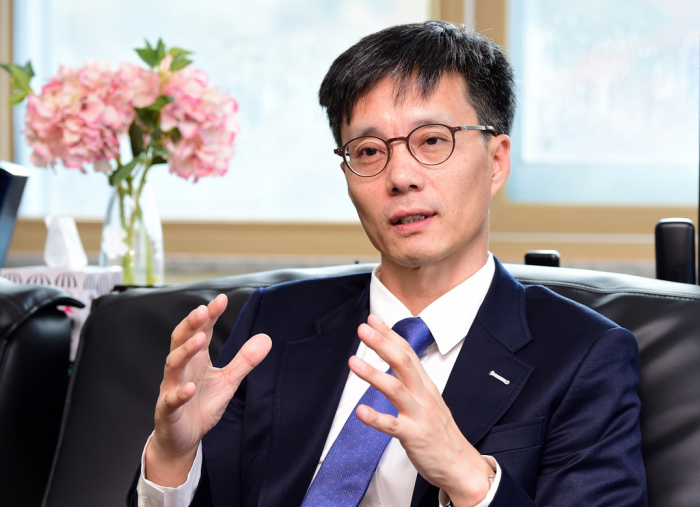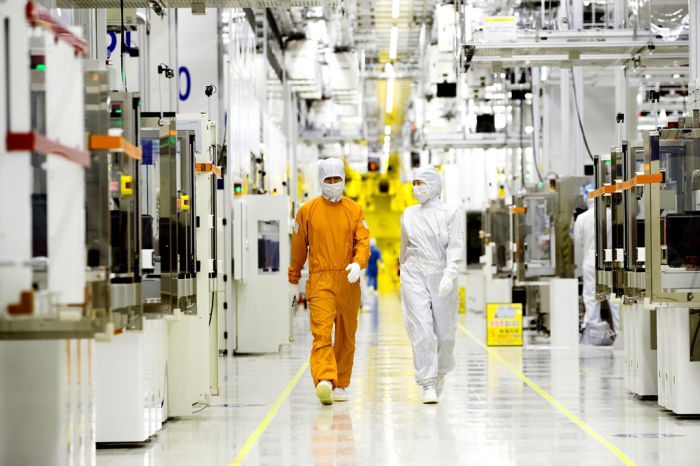Korean chipmakers
Korea losing ground in semiconductor talent development
SNU is reluctant to set up a course for Samsung Elec .and SK Hynix due to a lack of faculty, says expert Dr. Hwang Cheol-Seong
By May 09, 2022 (Gmt+09:00)
3
Min read
Most Read
LG Chem to sell water filter business to Glenwood PE for $692 million


Kyobo Life poised to buy Japan’s SBI Group-owned savings bank


KT&G eyes overseas M&A after rejecting activist fund's offer


StockX in merger talks with Naver’s online reseller Kream


Mirae Asset to be named Korea Post’s core real estate fund operator



South Korea, home to the world’s top two memory chipmakers, is losing ground for talent development in the semiconductor sector as fewer professors want to work for the industry amid declining government support, a renowned semiconductor scholar has said.
“The reality of the Korean semiconductor industry’s labor force is so poor. We do not have enough professors to instruct manpower for the sector,” said Dr. Hwang Cheol-Seong, a professor of Seoul National University’s Department of Materials Science and Engineering, Hybrid Materials.
Hwang, who led the Inter-University Semiconductor Research Center of the country’s top college from 2014 to 2015, is considered an expert on memory devices, semiconductor materials and processes.
“Both academics and industry have been urging need to prepare for a manpower shortage for six to seven years, but the government has not paid attention,” Hwang told The Korea Economic Daily in an interview on Sunday. “In the meantime, the sector has regressed with the high-end labor force having run out.”
Only about 10 professors out of the total 330 faculty members at SNU’s college of engineering focus on the semiconductor industy, while it is hard to find scholars that plan to continue study of that sector, Hwang said.
“This is not a problem only for SNU but a common phenomenon for the whole of academia,” he stressed.
GOVERNMENT CUTS INVESTMENT
That came as the foundation of the research and development, as well as education for the industry, weakened due to the government’s policy, according to him.
“The government has drastically reduced spending on research in recent years, saying it could not invest in an industry that has already been developed,” Hwang said. “It became difficult to continue semiconductor-related research.”
The cuts drove some professors with deep knowledge of the industry to other sectors, he added.
The slash also made it even harder to stand out with a thesis in the well-established semiconductor sector, although the publication of papers in major journals such as Nature and Science play a key role when evaluating colleges.
HARD TO ACCEPT OFFERS FROM SAMSUNG, SK HYNIX
A lack of faculty members is one of SNU's reasons not to embrace Samsung Electronics Co.'s and SK Hynix Inc.'s proposals to jointly foster high-quality manpower for the world’s two largest memory chipmakers, Hwang said.

Samsung and SK Hynix are competing to set up a temporary department to develop their own advanced labor force at the alma mater of Hwang Chang-gyu, a legend within South Korea’s semiconductor industry, according to local semiconductor industry sources.
“How can we train skilled semiconductor professionals without semiconductor professors?” Hwang asked.
Such a temporary department needs about 10 professors, but SNU cannot afford it, he added. SNU professors are government officials. SNU was reportedly unable to hire more faculty members as it is against current government policy to increase the number of public servants in any department or ministry.
LAGGING GLOBAL COMPETITORS
Considering such limits, South Korea’s investment in semiconductor talent is smaller and slower than those of its key global competitors, Hwang said.
“The US, Taiwan and others are rushing to foster manpower as a national policy,” Hwang said. “It is already late, but we still must change the atmosphere as soon as possible.”
South Korea needs to create a virtuous cycle ecosystem that provides professors with sufficient support for study and the development of high-quality manpower with master’s or doctorates, he said.
“We need a foundation for the government, universities and companies to jointly work on long-term research and industrial development,” Hwang stressed. “We also need to improve the quality of education to foster high-end manpower and maintain the industry’s competitiveness.”
Write to Ji-Eun Jeong at jeong@hankyung.com
Jongwoo Cheon edited this article.
More to Read
-
 Korean chipmakersSamsung, SK Hynix scramble for talent amid a lack government support
Korean chipmakersSamsung, SK Hynix scramble for talent amid a lack government supportMay 06, 2022 (Gmt+09:00)
6 Min read -
 The KED ViewCan Samsung Electronics ever catch up to foundry leader TSMC?
The KED ViewCan Samsung Electronics ever catch up to foundry leader TSMC?May 03, 2022 (Gmt+09:00)
4 Min read
Comment 0
LOG IN


